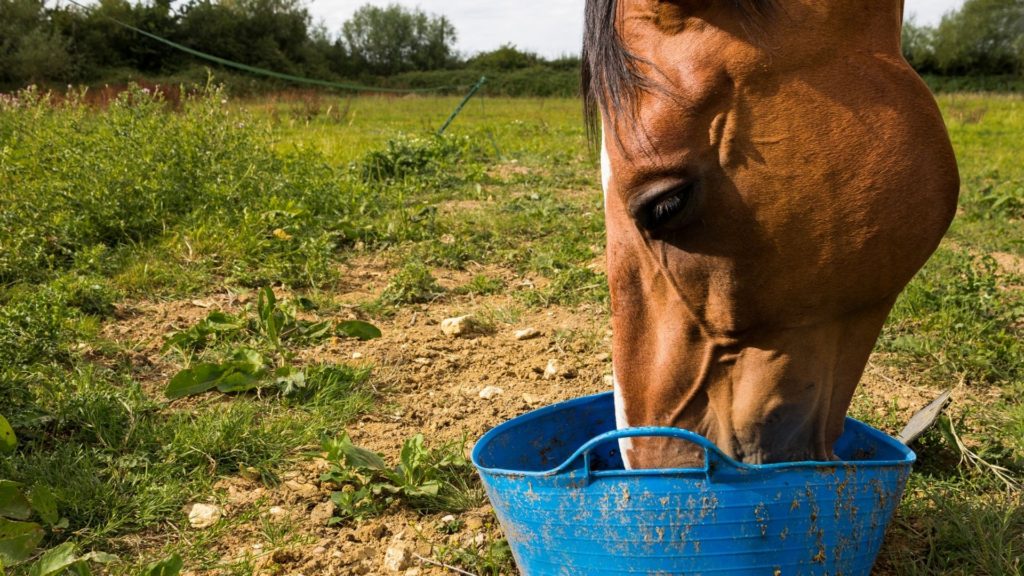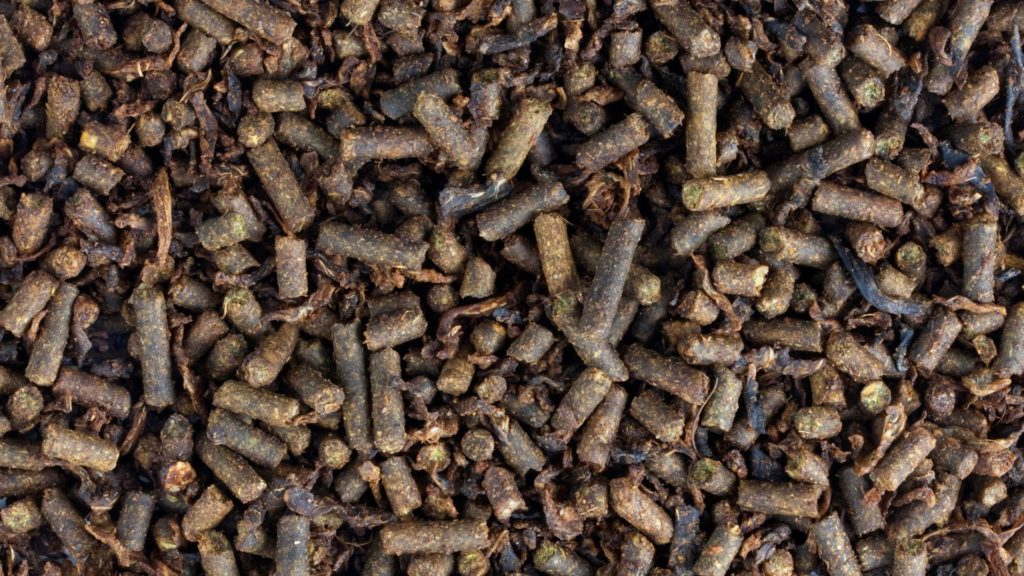Beet Pulp for Thin Horses Amt to Feed
Any links on this page that lead to products on Amazon are affiliate links and I earn a commission if you make a purchase. Thanks in advance – I really appreciate it!
I became interested in beet pulp when some friends were discussing the benefits of feeding it to horses. Beet pulp isn't popular in my region, so I wanted to know the good and the bad about it before I fed it to my horses. I researched beet pulp and learned there is confusion surrounding its potential benefits and drawbacks.
Beet pulp has good and bad points for horses, the good: it helps digestion and puts weight on horses because it's high in fiber and energy and low in sugar. The bad: beet pulp lacks proteins, vitamins, and minerals a horse needs, plus it has a high concentration of calcium.
Beet pulp isn't the ideal nutritional food source but adds value to a horse's diet, especially in certain circumstances. Some claim it makes horses hot and causes muscle weakness, but it can help treat ulcers and diarrhea. Let's learn more about why or why not any of these claims are plausible.

What is the nutritional value of beet pulp?
It's essential to know the correct nutritional value of anything you feed your horses. And if you intend to make drastic dietary changes, it's best to consult a trained nutritionist or your veterinarian.
So. let's find out about beet pulp. Besides its protein content, beet pulps' nutritional value is very similar to alfalfa. It's very high in digestible fiber, about 18 – 19%, and has a very high calcium-to-phosphorous ratio, more than ten to one.
Horses must consume more calcium than phosphorous in their diet. The recommended ratio is approximately 2:1. When horses take in more phosphorous than calcium, they are at risk of developing bone and muscle disorders.
The calcium to phosphorous ratio in beet pulp is too high the other way which makes it a viable source to mix with hay and feed low in calcium or those with extremely high phosphorous levels.
Beet pulp is high in energy, similar to calorie-rich horse grains. It promotes bacteria fermentation in the hindgut and releases fatty acids, which are converted into energy. However, it doesn't contain all the essential amino acids and lacks Vitamin A content.
As I said, beet pulp is similar in nutritional value to alfalfa hay but with one significant difference, protein levels. So let's look at how much protein is in beet pulp.
How much protein is in beet pulp?
I always like to keep an eye on my horse's protein intake when feeding it supplements like beet pulp. Getting the numbers wrong can lead to some otherwise preventable digestive or performance problems.
Beet pulp generally contains 7 – 8% protein content. On average, adult horses, even those that don't participate in strenuous exercise, need at least 12 – 13% protein in their feed, so beet pulp alone doesn't give most horses enough protein.
Besides that, horses yet to mature or those involved in regular strenuous training or shows might need up to 20% protein. In that case, mixing beet pulp with a generous amount of alfalfa pellets or cubes might be the way to go.
Is beet pulp high in sugar?
Beet pulp is made when the juice of sugar is extracted from sugar beet. Sugar beet is valued for its high sugar content, so people often inaccurately assume beet pulp is high in sugar and dangerous for horses.
Beet pulp for horses contains a minimal amount of sugar. It is considered a by-product of sugar beet, with most of the non-structural carbohydrates absorbed out of it. Most samples of beet pulp contain about 10 – 12% of sugar content.
Furthermore, it's often recommended to soak beet pulp before feeding it to your horse. Soaking the beet pulp and adding more water to rinse it can further reduce the sugar content.
Since beet pulp is low in sugar, sellers often add molasses to it to make the feed more appetizing. Beet pulp with molasses is slightly higher in sugar, containing about 16% of non-structural carbohydrates.
What does beet pulp do for horses (the benefits)?
Although from looking at beet pulp, you could easily mistake it for a concentrate such as oats but don't be fooled; it's a high caloric forage digested in the hindgut. Because of the high amount of starches in concentrates, horses digest them in their small intestine.
Horses should get calories from forage if possible, and beet pulp is a good source. It is an excellent food source for horses that have difficulty putting and keeping weight on without supplementing their diet with traditional concentrates.
Beet pulp is also good for horses that can't chew their food properly or need to avoid dusty feeds because they have a respiratory issues.
It's also remarkably low in potassium, so it's good for horses with a restricted potassium intake in their diet. When horses have chronically elevated levels of potassium, they can develop muscle tremors or paralysis.
Some horses are genetically prone, and others develop high levels of potassium from their diet. For these horses, beet pulp is a good forage choice.
You may run across horses that don't find beet pulp palatable, but most horses quickly transition to it. Why is this, and does beet pulp have any other benefits that make it stand out in a horse's diet?
Beet pulp helps horses gain weight.
I've been told that I should give beet pulp to my horses when they need to add weight. And sure enough, beet pulp works almost as well as alfalfa in putting pounds on your horse.
Beet pulp is high in fiber and low in sugar or non-structural carbohydrates. The energy it produces mainly comes from fermentation in the hindgut and is released in small amounts, so it doesn't make the horse overly active.
So, when consumed heavily, beet pulp is rich in energy but doesn't include harmful amounts of sugars that can cause laminitis in horses. The fiber in beet pulp is very digestible, which is why some horses won't stop eating it. Therefore, mixing your horse's diet with a portion of beet pulp is a safe way to help it gain more mass.
Beet pulp is good for horses with diarrhea.
Beet pulp is often considered a good way to treat diarrhea in horses. To counter the effects of diarrhea, you need a feed that is high in fiber and dry content. This way, the excess liquid in the stomach that causes diarrhea becomes concentrated.
Beet pulp essentially helps horses with diarrhea by increasing the time the food in the mouth takes to reach the end of the intestines. The high amount of fiber is good at absorbing moisture and keeping the food in the stomach for a long while as it gets properly digested.
Check out my other article on how to treat or prevent diarrhea in horses.
Beet pulp is good for horses with ulcers.
Recently I was considering different feed options for a horse with ulcers and decided to research if beet pulp. What I found out surprised me, in many ways, beet pulp is similar to alfalfa which is recommended for horses with ulcers.
Beet pulp is potentially good for horses with ulcers. A high source of soluble fiber like beet pulp is generally effective in preventing stomach ulcers. Lower amounts of starch in the diet, like in beet pulp, are also linked with lower chances of developing ulcers.
It is often recommended to increase the moisture content of a horse's diet to prevent ulcers. The moisture helps buffer the acidity of the stomach. Beet pulp checks this box and is usually heavily soaked before feeding.

Beet pulp is good winter food.
Beet pulp is a healthy feed to include in your horse's winter diet. In cold temperatures, horses are tempted to eat more food to generate more heat and keep their bodies hot. A downside of this can be an imbalance of proteins or sugar in their bodies which can cause all sorts of health issues.
Because beet pulp is low in sugar and proteins but high in digestible fiber, it is safe to feed large amounts in winter. It is good for the microbes in the hindgut and improves a horse's digestive abilities. However, it's worth mentioning again that a diet consisting of purely beet pulp is not healthy.
Horses are often reluctant to drink plain water in winter. So, beet pulp soaked in water can provide an easy way to keep your horse hydrated in the winter. A hydrated horse is also happy to go riding on winter and snowy days.
Why is beet pulp bad for horses?
There is a persistent myth that beet pulp is bad for horses. However, in my experience, beet pulp mixed with other hay doesn't have any adverse effects on a horse's health. You can consider it bad in the sense that it doesn't provide all the essential nutrients.
A diet consisting solely or primarily of beet pulp is not healthy for horses. The higher amounts of calcium and lower amounts of minerals like phosphorous in beet pulp can cause muscle and bone weakness in your horse. Mixing beet pulp with grass hay like Bermuda hay with a safer calcium-to-phosphorus ratio can fix this.
Beet pulp is also lacking in Vitamin A and protein content. A growing or hard-working horse needs a high amount of protein in its diet. When mixed with other feeds, beet pulp shouldn't take up more than half of the total diet. When I am using beet pulp, I add only about 20 – 25% of it in hay or grain.
Beet pulp also has an unfair reputation for causing choke in horses. In truth, any dry feed has some risk of getting stuck in the esophagus.
Feeding dry beet pulp to aggressive eaters can increase the chances of developing choke. However, soaking beet pulp can reduce this risk; we discuss the benefits of feeding wet beet pulp in more detail later in this article.
Does beet pulp make horses hot?
It's often claimed that feeding beet pulp makes your horse hot or difficult to manage. However, there's nothing particular in the nutritional content of beet pulp to suggest this.
The claim that beet pulp makes horses hot is likely from the misunderstanding that beet pulp is high in sugar. In reality, beet pulp is very low in sugar because sugar beet is deliberately processed to soak out most of the sugar and leave behind the fibrous residue, which is beet pulp.
Beet pulp is also low in protein, so there's no issue about your horse becoming hot due to a large protein intake. And the fatty acids produced by the fermentation in the hindgut aren't a cause of concern either; they produce gradual amounts of energy rather than causing a sudden spike of glucose.
How to feed beet pulp to your horse.
Beet pulp can be fed dry, soaked, steamed, separately, mixed with other forage, or mixed with grain. The way you feed it depends on your horse and its needs. Picky eaters may turn away from beet pulp in its dry form, so you may need to make some changes to increase its palatability.

Do you have to wet beet pulp for horses?
Horses can and often do eat dry beet pulp. But it's usually better to wet it with water before feeding to horses. Soaking the beet pulp can have many benefits.
Wetting beet pulp prevents it from swelling in the stomach. The swelling of the beet pulp isn't a health risk but may make horses uncomfortable. If you are feeding beet pulp to a sugar-sensitive horse, soaking it in water can reduce the sugar content.
Senior horses or those that have difficulty chewing their food can benefit from wet beet pulp as it is easier to ingest. Also, beet pulp isn't delicious; adding water can enhance its flavor, and horses eat it better.
How long do you soak beet pulp before feeding?
Don't soak beet pulp too long because it ferments and is unfit to feed. When this happens, the texture and odor are harsh, and you should discard them.
Beet pulp should be left in water for at least 30 – 40 minutes. Sometimes it can take up to two hours for the beet pulp to absorb the water. The absorption rate depends on your beet pulp quality, the amount of water, the temperature, and whether the pulp is in pellet form or shredded.
Sometimes the water can take up to two hours to get absorbed.
The recommended ratio is three to four parts water to one part beet pulp. Warm water gets absorbed faster than cold water. If the temperature is cold, fermentation takes longer, and also; shredded beet pulp soaks up moisture more efficiently than pellets or cubes.
Generally, you should periodically check the soaked beet pulp to ensure it isn't giving off an unpleasant odor. Mix the beet pulp with some other nutrient-rich diet like alfalfa or grass hay. If your horse is new to shredded or fiber-rich feeds, introduce the beet pulp slowly and see how it accustoms to it.
FAQ
Is it better to feed your horse cubes or pellets?
Pellets may be easier for you to scoop and store, but they have the same nutritional value as cubes. Horses are individuals and some may do better eating cubes than pellets and vice versa.
It's really up to you and your horse. I wrote an article comparing Alfalfa cubes to pellets you may find interesting: Alfalfa Pellets vs. Cubes: What's Better for Your Horses?
Do you have to feed your horse grain?
No, most horses do fine on a forage only diet, but if you work your horse regularly they need extra calories and you should supplement their diet with grain.
You may find this article helpful, it goes into greater detail about feeding horses grain: Does a Horse Need Grain: Oats, Barley, Both or None?
Source: https://horseracingsense.com/feeding-beet-pulp-to-horses-good-and-bad/
Enregistrer un commentaire for "Beet Pulp for Thin Horses Amt to Feed"